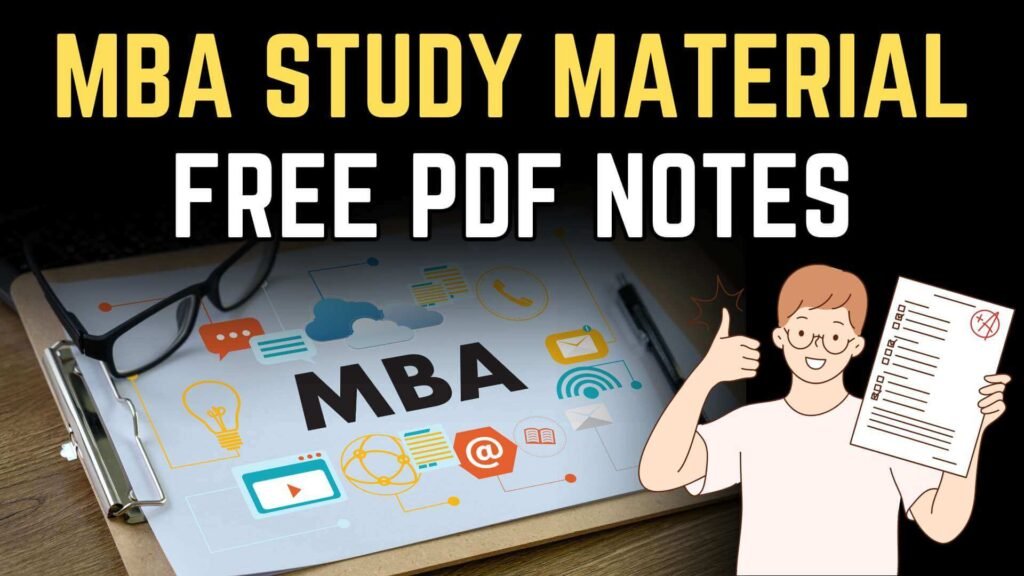Free MBA Study Material
Hi discover free MBA study material that notes for specializations like Marketing, Finance, Operations Management, Human Resource Management. Embarking on an MBA journey is an exciting and rewarding endeavor. To excel in this rigorous program, having access to comprehensive study materials is crucial. As an MBA student, you need high-quality resources that encompass a wide range of subjects and provide in-depth knowledge to sharpen your skills.

MBA Human Resource Management Notes
How to Make Notes During Your MBA?
Pursuing an MBA is a transformative journey that equips you with the skills and knowledge needed to thrive in the business world. However, the volume of information can be overwhelming. Making effective notes is key to not only surviving but excelling in your MBA program. This guide will help you master the art of note-taking and provide you with the best sources and books to refer to for different specializations like Marketing, Finance, Operations, IT Systems, and Human Resources.
Why Effective Note-Taking is Crucial in an MBA Program?
MBA programs are fast-paced, with a curriculum that covers a wide range of subjects. Effective note-taking helps you:
- Retain Information: Writing down key points during lectures and while reading helps reinforce your understanding.
- Organize Thoughts: Structured notes help you organize complex concepts and ideas systematically.
- Prepare for Exams: Well-organized notes are invaluable when it’s time to review for exams or write papers.
- Reference for Future Use: Your notes become a personalized resource that you can refer to even after you graduate.
How to Make Effective Notes: A Step-by-Step Guide
Choose the Right Tools
- Digital vs. Paper: Decide whether you prefer taking notes on a laptop or in a notebook. Digital tools like Evernote, Notion, or Microsoft OneNote offer features like searchability and cloud sync, while paper notes may help with memory retention.
- Organizational Tools: Use folders, tags, or color-coding to keep your notes organized by subject and topic.
Adopt a Structured Format
- Cornell Method: Divide your page into three sections: notes, cues, and summary. This method helps in reviewing and revising later.
- Mind Mapping: Useful for visual learners, this method allows you to connect related ideas and see the bigger picture.
- Bullet Points and Headings: Use bullet points for listing key concepts and headings to organize topics.
Focus on Key Concepts
- Don’t try to transcribe everything the professor says. Focus on key points, definitions, formulas, and examples.
- Highlight or underline important information that is likely to be on exams or that you need to understand deeply.
Review and Revise
- Spend a few minutes after each class reviewing and refining your notes. This reinforces what you’ve learned and fills in any gaps while the information is still fresh.
Integrate Multiple Sources
- Combine lecture notes with insights from textbooks, case studies, and research papers. This comprehensive approach helps you understand topics from multiple angles.
Sources and Books to Refer for Different MBA Specializations
1. Marketing
- Books:
- “Marketing Management” by Philip Kotler: A must-read that covers the fundamentals of marketing strategies, consumer behavior, and market research.
- “Contagious: How to Build Word of Mouth in the Digital Age” by Jonah Berger: This book explores the science behind why things go viral, an essential read for digital marketing enthusiasts.
- Sources:
- Harvard Business Review (HBR): Offers case studies, articles, and insights on the latest marketing trends.
- MarketingProfs and HubSpot Blogs: Great for staying updated on digital marketing strategies and tools.
2. Finance
- Books:
- “Principles of Corporate Finance” by Richard Brealey, Stewart Myers, and Franklin Allen: This book is the gold standard for corporate finance, covering everything from capital budgeting to risk management.
- “The Intelligent Investor” by Benjamin Graham: A classic that teaches the fundamentals of value investing.
- Sources:
- Financial Times and The Economist: Essential for staying updated on global financial markets and economic trends.
- CFA Institute Publications: Great for deep dives into investment management and financial analysis.
3. Operations
- Books:
- “The Goal” by Eliyahu M. Goldratt: This book uses a narrative format to explain the theory of constraints, a key concept in operations management.
- “Operations Management” by William J. Stevenson: Comprehensive coverage of operations processes, supply chain management, and quality control.
- Sources:
- Supply Chain Digest and APICS: These platforms offer industry insights, case studies, and best practices in operations and supply chain management.
- MIT Sloan Management Review: Provides research-based articles on operations and innovation management.
4. IT Systems
- Books:
- “Management Information Systems: Managing the Digital Firm” by Kenneth C. Laudon and Jane P. Laudon: A foundational text on the role of information systems in business.
- “The Innovator’s Dilemma” by Clayton M. Christensen: Explores how businesses can adapt to disruptive technologies.
- Sources:
- Gartner and Forrester Research: Leading sources for trends, reports, and analysis in IT systems and digital transformation.
- TechCrunch and Wired: Great for staying updated on the latest in technology, startups, and innovation.
5. Human Resources
- Books:
- “Human Resource Management” by Gary Dessler: A comprehensive guide to HR practices, including recruitment, performance management, and labor relations.
- “Drive: The Surprising Truth About What Motivates Us” by Daniel H. Pink: This book delves into the psychology of motivation, a key aspect of HR management.
- Sources:
- SHRM (Society for Human Resource Management): Offers articles, case studies, and toolkits for HR professionals.
- HBR and CIPD (Chartered Institute of Personnel and Development): Excellent for thought leadership and best practices in HR management.
Additional Tips for Effective Note-Taking in MBA
- Stay Engaged in Class: Active participation in discussions helps reinforce your learning, making it easier to take meaningful notes.
- Form Study Groups: Sharing and discussing notes with peers can provide new perspectives and fill in any gaps you may have missed.
- Attend Workshops and Seminars: Take advantage of additional learning opportunities offered by your institution to broaden your knowledge base.
- Practice Case Studies: Regularly work on case studies to apply theoretical concepts to real-world scenarios, and make notes on key takeaways.
Must Explore
Mumbai University MBA Syllabus
Certification Courses for MBA Marketing



I cannot find the download button where should I look?
Click on the given text, it is hyperlinked
Thank you for sharing these resources! The free PDFs will be super helpful as I prepare for my MBA. I appreciate the effort you put into curating this material for us. Looking forward to exploring the content!
Thanks